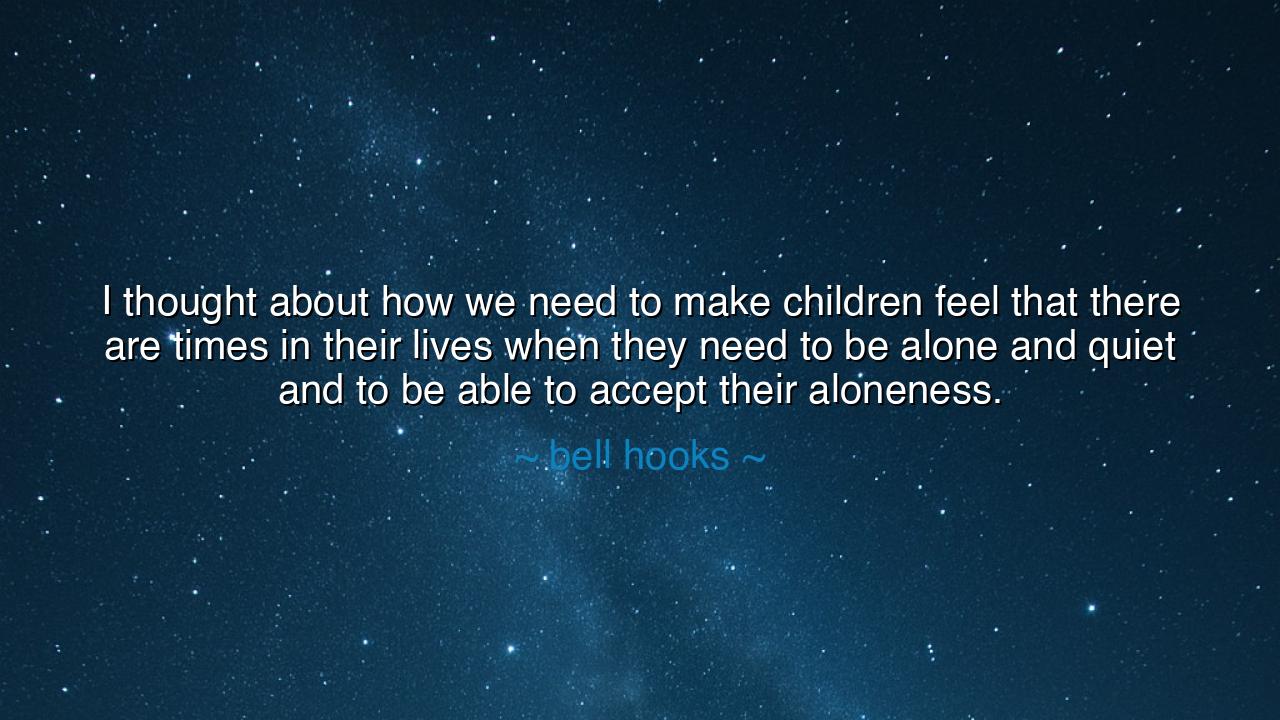
I thought about how we need to make children feel that there are
I thought about how we need to make children feel that there are times in their lives when they need to be alone and quiet and to be able to accept their aloneness.






In the luminous and nurturing words of bell hooks, she wrote: “I thought about how we need to make children feel that there are times in their lives when they need to be alone and quiet and to be able to accept their aloneness.” These words, at once gentle and profound, call us back to the ancient wisdom that the soul must learn silence before it can learn strength. hooks, a philosopher of love and liberation, speaks here not only of childhood but of the human condition itself — for she knew that to live meaningfully, one must learn the sacred art of aloneness, not as isolation, but as the birthplace of self-awareness and peace.
When hooks says that children must learn to accept their aloneness, she does not mean abandonment or neglect, but solitude — that quiet state in which the spirit turns inward and listens to itself. In a world overflowing with noise, distraction, and constant stimulation, she recognized the danger of a generation growing up unable to be still, unable to dwell with their own thoughts without fear. For the child who cannot sit quietly becomes the adult who runs from reflection; the one who fears solitude becomes the one who mistakes company for connection. hooks understood that true independence, emotional and spiritual, begins in the gentle strength of being at ease with one’s own soul.
The origin of this wisdom is found in hooks’ lifelong teaching about love, community, and self-knowledge. In her works — such as All About Love and Teaching to Transgress — she wrote that love cannot exist without self-awareness, and self-awareness cannot exist without solitude. She saw how modern culture, in its obsession with busyness and validation, denies children the space to know themselves apart from others. By teaching them to always seek noise and companionship, we rob them of the chance to hear the quiet voice within — the voice of being. To raise wise, compassionate adults, she believed, we must first raise children who can bear silence, who can find comfort in their own company, and who understand that solitude is not emptiness, but fullness waiting to be discovered.
Consider the story of Henry David Thoreau, who withdrew to the woods of Walden Pond, seeking truth in stillness. He was not fleeing society, but searching for his soul — learning, as hooks described, to “accept his aloneness.” There, in the company of wind, water, and trees, he discovered that solitude was not loneliness, but communion with life itself. The stillness taught him to see, to listen, to feel deeply. Thoreau’s solitude gave birth to insight, just as hooks teaches that the quiet space given to a child becomes the soil in which creativity, empathy, and inner strength grow.
And yet, hooks’ words also hold tenderness — for she knew that to teach solitude, we must first teach safety. A child must know they are loved before they can find peace in being alone. Solitude becomes healing only when it is born of trust, not fear. To give a child permission to be alone is to tell them: your own company is worthy; your inner world matters. In this way, aloneness becomes not punishment, but empowerment — a time for reflection, imagination, and self-love.
From her wisdom emerges a lesson for all generations: we must learn to make peace with our own presence. To sit in silence without reaching for distraction; to be alone without feeling incomplete — this is the beginning of spiritual maturity. For the soul that cannot rest in itself will forever seek others to fill its void. To teach children — and ourselves — to embrace stillness is to build a foundation for resilience, clarity, and compassion. In solitude, one learns to listen not only to the self, but to the quiet whisper of the divine.
Let this be the teaching: cultivate moments of stillness. For yourself, and for the young. Do not fear silence; let it become a companion, a teacher. Turn off the noise, close the door, and sit with your thoughts. Allow yourself to feel the weight and wonder of your own being. In that space, you will find not loneliness, but wholeness.
Thus, the words of bell hooks endure as a quiet commandment for the modern age: the child — and the adult — who learns to accept aloneness becomes the one who walks the world with peace in their heart. For the one who has made friends with solitude can never truly be alone, for they have found within themselves a home that no one can take away.






AAdministratorAdministrator
Welcome, honored guests. Please leave a comment, we will respond soon